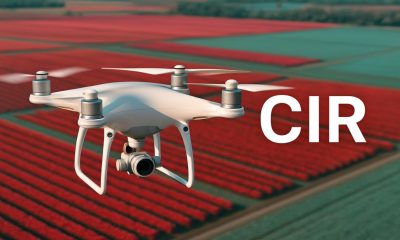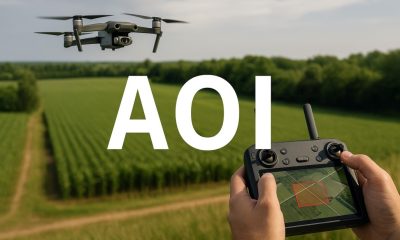Chinese Drone Regulations
Penalties and Enforcement for Drone Regulations in China
Published
11 months agoon
Table Of Contents

Penalties and Enforcement
China’s regulatory framework for drone operations is enforced with stringent penalties to ensure compliance and maintain airspace safety. The Civil Aviation Administration of China (CAAC) plays a central role in monitoring and enforcing these regulations. Non-compliance can result in severe consequences, including substantial fines, confiscation of equipment, and suspension or revocation of operating licenses. In serious cases, individuals and companies may face criminal charges, leading to imprisonment. The enforcement mechanisms are designed to deter unlawful drone activities and ensure that all operators adhere to the established safety and privacy standards. Understanding these penalties is crucial for all drone operators to avoid legal repercussions and operate within the bounds of Chinese law.
Types of Violations
Common Violations
- Flying Without a Certificate: Operating a drone without the necessary Basic or Advanced Operations certificate.
- Unregistered Drone: Using a drone that has not been registered with the CAAC.
- Operating in Restricted Airspace: Flying a drone in controlled or restricted airspace without proper authorization.
- Exceeding Altitude Limits: Flying a drone above the maximum permitted altitude of 120 meters (400 feet).
- Flying Beyond Visual Line of Sight (VLOS): Operating a drone beyond the pilot’s visual line of sight without special permission.
- Night Operations Without Proper Lighting: Flying a drone at night without the required anti-collision lights.
- Inadequate Safety Measures: Failing to conduct pre-flight checks, maintain a flight log, or follow safety protocols.
- Privacy Infringements: Collecting or using personal data without consent or violating privacy laws.
Penalties
Fines and Financial Penalties
The CAAC imposes fines on individuals and organizations for violations of drone regulations. The severity of the fine depends on the nature and extent of the violation.
- Individuals: Fines can range from ¥1,000 to ¥50,000 for each violation.
- Organizations: Fines can range from ¥10,000 to ¥200,000 for each violation.
Examples of Specific Fines
- Operating Without a Certificate: Up to ¥10,000 for individuals and up to ¥50,000 for organizations.
- Unregistered Drone: Up to ¥10,000 for individuals and up to ¥50,000 for organizations.
- Flying in Restricted Airspace: Up to ¥20,000 for individuals and up to ¥100,000 for organizations.
- Exceeding Altitude Limits: Up to ¥10,000 for individuals and up to ¥50,000 for organizations.
Criminal Charges
In cases of severe violations, especially those involving significant risk to public safety or national security, criminal charges may be pursued. This can lead to more severe penalties, including higher fines and imprisonment.
Enforcement Actions
Inspections and Audits
The CAAC conducts regular inspections and audits to ensure compliance with drone regulations. This can include:
- On-Site Inspections: Inspecting drones, control stations, and operational sites.
- Document Audits: Reviewing flight logs, maintenance records, and certification documents.
Reporting Violations
Individuals and organizations can report suspected violations of drone regulations to the CAAC. This can be done through:
- Online Reporting: Using the CAAC website to submit a report.
- Hotline: Calling a designated hotline to report violations.
Enforcement Procedures
When a violation is detected, the CAAC follows a set enforcement procedure:
- Investigation: Conducting a thorough investigation to gather evidence and assess the severity of the violation.
- Notification: Informing the operator of the violation and the impending enforcement action.
- Penalties: Imposing appropriate penalties, including fines or other sanctions.
- Appeals: Providing the operator with an opportunity to appeal the decision or request a review.
Appeal Process
Operators who receive penalties can appeal the decision through the following steps:
- Review Request: Submit a formal request for review to the CAAC within the specified time frame.
- Hearing: Attend a hearing where evidence and arguments can be presented.
- Decision: Await the decision from the CAAC, which may confirm, modify, or overturn the original penalty.
Preventative Measures
Education and Training
The CAAC provides educational resources and training programs to help drone operators understand and comply with regulations. These include:
- Online Courses: Training modules and certification courses available online.
- Workshops and Seminars: In-person and virtual workshops to educate operators on best practices and regulatory requirements.
Public Awareness Campaigns
The CAAC conducts public awareness campaigns to inform the general public and drone operators about the importance of following drone regulations. These campaigns aim to:
- Promote Safety: Highlight the importance of safe drone operations.
- Clarify Regulations: Provide clear information on the rules and how to comply with them.
- Encourage Reporting: Encourage the public to report unsafe or illegal drone activities.
Summary
Penalties and Enforcement are essential components of the regulatory framework governing drone operations in China. By imposing fines and other penalties for violations, the CAAC ensures that operators adhere to the rules, thereby maintaining safety, privacy, and security. Understanding the types of violations, potential penalties, and enforcement procedures helps operators comply with regulations and avoid legal issues. Education, training, and public awareness initiatives further support compliance and promote responsible drone usage.
To Learn more about acronyms used in this article visit our Drones Acronym Page.











